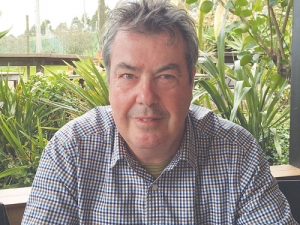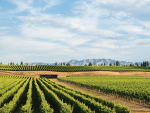I was introduced to the wine industry through school and university holiday jobs at Montana Wines.
I represent Category 1 (Small) Winemakers.
When my father started The Wine Institute, he brought many overseas experts to evaluate our country's potential and share their knowledge. Often they would stay in the nearby Mon Desire Hotel and my mother would send me to keep them company over breakfast where I learned much about the global world of wine.
I studied law, maths and computing at university and while there undertook the first ever analysis of production and sales data from The Wine Institute's founding members. I presented this as a profile of the emerging preferences of our typical wine drinker which back in 1971 showed a clear trend away from sherry and port to still table wine and within that a strong move from red to white.
After graduating from Law school I worked in finance and banking including creating financial products enabling wine companies to take advantage of Rob Muldoon's Industry Development incentives to fund winery infrastructure.
In 1984 I returned to the Hawke's Bay where I grew up. There I helped finance conversion to grapes and was mentored by my father's good friend Tom McDonald. Tom inspired me to make wine and in April 1987 I purchased bare land on Waiheke, that with the help of my brother John, was developed into the Te Motu Vineyard.
Despite my predictions of a market preference for white wine, passion ruled my early moves and we planted for a Cabernet/s driven Bordeaux style Claret. Of course, like many others, I was going to make the world's best wine. We made some good wines but the business was financially challenging which is the case for many small producers and during recent years much bigger companies as well.
At 50, I retired from banking to focus entirely on wine. It was 2006 just before the double hit of the GFC and surplus supply. Our industry changed radically. However I could see recovery and growth. I became a Marlborough grower and have added a passion for sustainable stewardship of land to my passion for wine.
I see myself as both a grape-grower and a winemaker but in quite distinct roles. Making wine on Waiheke is very different to growing grapes for supply in Marlborough.
My father Terry inspired me to stand for the board. Although our industry is very collegial, I, like many others, was an Island, doing my own thing in my way. I have been privileged to meet and learn from many champions of our industry.
Whatever the issue facing me, Terry could always point me in the direction of an expert willing to help. Terry is big on knowledge sharing, continuous improvement and the need for individuals to give back. It is my turn to give back.
I am on the Finance committee where I have advocated reductions in both levy and reserves. I believe we should only levy as required for an agreed and budgeted level of services and not carry excess reserves. I support increased research expenditure.
I chair a new board "Working Group" which is investigating whether changes can be made to our regulatory framework to protect the reputation of New Zealand wine.
Essentially we want to ensure that wine labelled as New Zealand Wine is made entirely from New Zealand grown grapes that are fit for the purpose of making good quality wine. I believe we can make progress here by formalising Geographic Indications (GIs) and limiting sugar additions to a 1.5% lift in alcohol by volume.
I would like to be on the Advocacy and Research Committees, as I believe this is where I can most benefit members.
New Zealand Sauvignon Blanc is now a must on the world's wine list. This I believe is our greatest single achievement to date. It also gives rise to our greatest threats being: brand erosion through both low value and low quality, commoditisation through oversupply and huge reliance on one variety. We have seen the market savage Australian Shiraz. Let's not follow. I do not see how we can control growth so we must focus on maintaining the quality and integrity of our wines.
The growth of parasitic and pathogenic organisms hosted in our rapidly growing vineyard plantings is a major threat.
Consider how Phylloxera ravaged Europe in the past and more recently how Esca has drastically reduced yields in France and is moving across Europe and is now in California.
These organisms do travel and we need to be prepared. Emergence of the sexual stage of powdery is a local example and highlighted deficiencies in our spray programs. In this respect we must lift our game.
There are many other biosecurity risks that could have devastating impact such as the brown marmorated stink bug or the glassy-winged sharpshooter and we need operational agreements in place with MPI and other crop growers so we can act with urgency and efficiency if needed.
Looking to the future I see huge potential for our wines. Globally ethnic and cultural veils are being lifted and unsurprisingly people are more similar than different. They want the same things, including wine.
Wine is an expression of land, soils and seasons; of varieties and styles; and of people and their passion. New Zealand's story is as diverse as our cultural make up and wine making regions. Our future looks good but we need to protect the foundations of our reputation – vine health and wine integrity. This I see as the prime focus for New Zealand Winegrowers.














